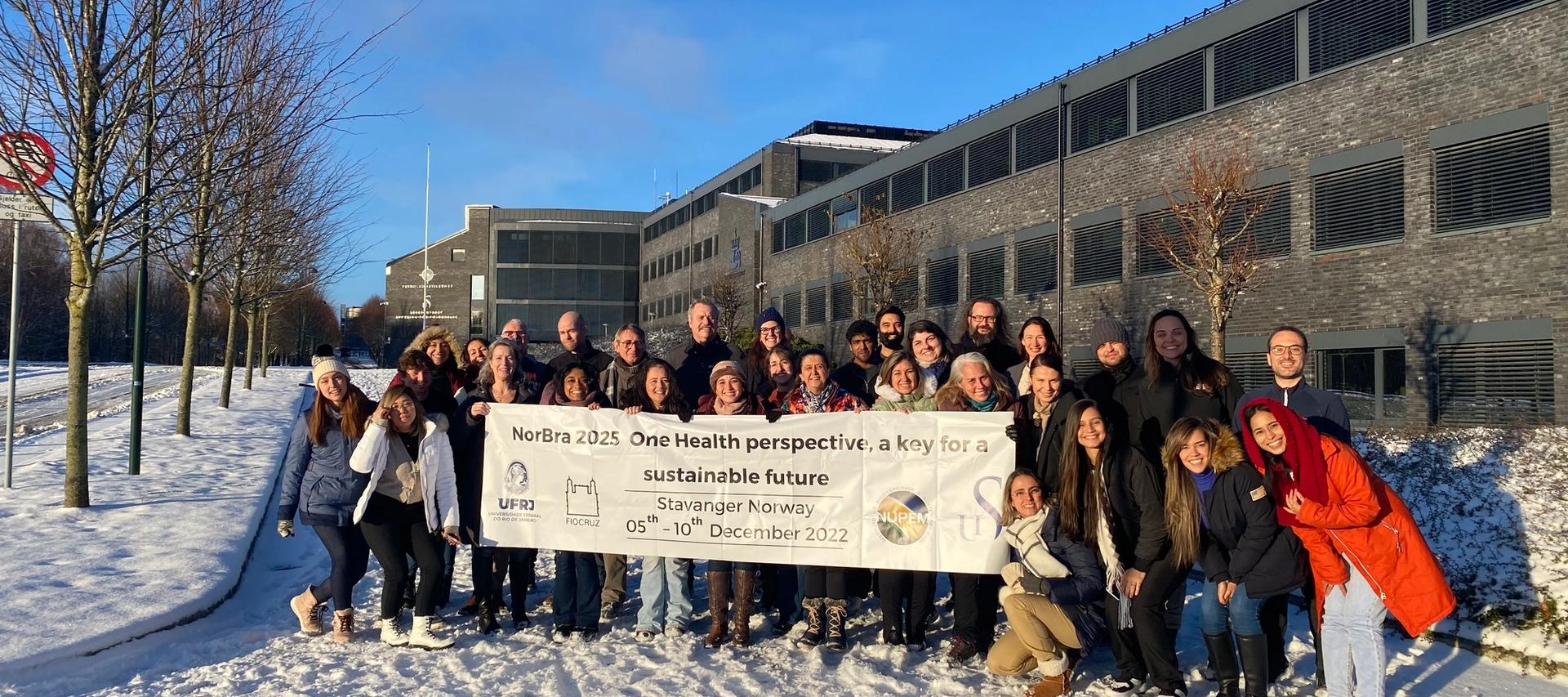NorBra 2025: One Health perspective, a key for a sustainable future
NorBra 2025 offers an exciting opportunity for students who are interested in tackling the challenges associated with human, organisms, and ecosystem health.
Recently edited: 3. December 2025
Group of students at the OneHealth school in Stavanger in December 2022
Foto: Daniela M. PampaninAbout the project
Responsible: University of Stavanger, Daniela M. Pampanin
Duration: 11, 2021 - 7, 2025
Area: Ecology, Environmental Sciences, Economics, Educational sciences, pedagogy and didactics, Public health
Partners: Federal University of Rio de Janeiro (BR-UFRJ), Oswaldo Cruz Foundation (BR), Oswaldo Cruz Institute (BR-FIOCRUZ), University of California Riverside (US-UCR), Stavanger University Hospital (NO), Peripécia Filmes (BR), NORCE Norwegian Research Centre AS (NO), Norwegian University of Life Sciences (NO-NMBU), NO-DeOx (NO), Luminase (BR), T&D Sustentável (BR), American Insight (BR)
Funding: 3 000 000 NOK
Background
“One Health is an integrated, unifying approach that aims to sustainably balance and optimize the health of people, animals and ecosystems.” – World Health Organization.
In a continuation and expansion of the NorBra 2020 project, the University of Stavanger (UiS), and the Federal University of Rio de Janeiro (UFRJ) have partnered to establish a formalised student training program, based on the One Health integrated approach. NorBra 2025 provides an opportunity for students to immerse in an international research community, taking advantage of Norway and Brazil’s offerings regarding infrastructure, technology, biodiversity, and natural resources.
Read more about the NorBra 2025 project at the projects own webpage (external link)
Participants
Dr. Daniela M. Pampanin is the project coordinator of NorBra 2025. She is the Leader of the Ecotoxicology and Environmental Monitoring research groups at the Department of Chemistry, Bioscience and Environmental Engineering at the University of Stavanger, and has been leading the NorBra project since its first iteration in 2020.
Dr. Rodrigo Nunes is NorBra 2025’s main partner project coordinator. He is an associate professor at the Institute of Biodiversity and Sustainability (NUPEM) of the Federal University of Rio de Janeiro (UFRJ).
Along with an interdisciplinary team, including members from several institutions in Norway, Brazil, and the United States, the NorBra 2025 project strives to create a flow of students and partners among institutions, through an international learning environment that facilitates the transfer of knowledge and experience.
Activities
NorBra 2025 focuses on identifying main points within the Norwegian and Brazilian academic settings regarding Environmental Sciences, Economics, Educational Sciences, and Public Health.
The main activities developed in this project include:
- Establishment of Formal Agreements (e.g. joint master’sstudy program)
- Co-teaching
- Co-supervision of students in ongoing research
- Intensive courses (e.g. Biodiversity school)
- Student participation in workshops and seminars
- Team member workshops
- Communication of project achievements (e.g. MSc theses, papers, conferences, public events)
Results
NorBra 2025 has achieved several milestones since its implementation in 2021. Thanks to this project, students from UiS and UFRJ have been able to attend guest lectures and enroll in The One Health School (carried out in Stavanger in December 2022). They have also been able to participate in student exchanges and now have access to virtual tools, such as thematic workshops and digital materials.
The opportunities in research have also widened because of this project. PhD students have worked and received co-supervision from UiS and UFRJ. Master and PhD students now have the possibility to work on common research projects, strengthening their network and complementing their knowledge. This collaborative partnership and co-supervision have been very successful, with several students' scientific findings showcased at both national and international conferences, and subsequently featured in the 2022 editions of scientific papers.
Advice
- Follow call guidelines and participate to HKDir ’s info meetings.
- Apply with committed partners which truly wish to establish long term collaboration, beyond the project period.
- Use a multidisciplinary approach.